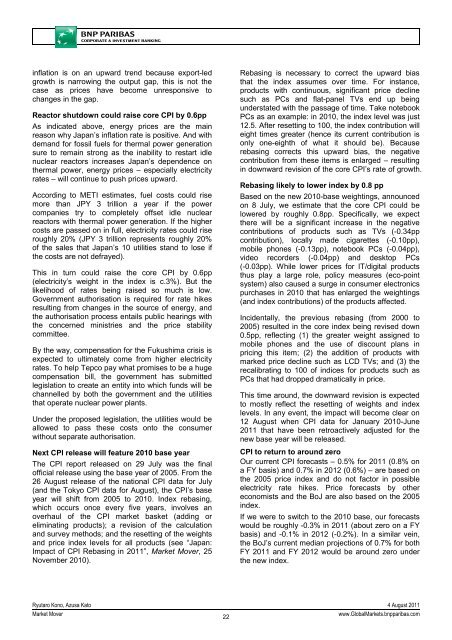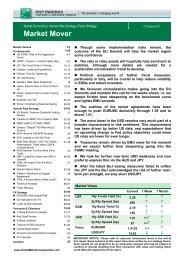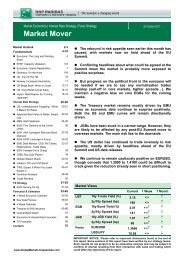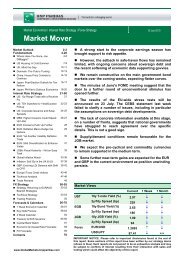MARKET MOVER - BNP PARIBAS - Investment Services India
MARKET MOVER - BNP PARIBAS - Investment Services India
MARKET MOVER - BNP PARIBAS - Investment Services India
You also want an ePaper? Increase the reach of your titles
YUMPU automatically turns print PDFs into web optimized ePapers that Google loves.
inflation is on an upward trend because export-led<br />
growth is narrowing the output gap, this is not the<br />
case as prices have become unresponsive to<br />
changes in the gap.<br />
Reactor shutdown could raise core CPI by 0.6pp<br />
As indicated above, energy prices are the main<br />
reason why Japan’s inflation rate is positive. And with<br />
demand for fossil fuels for thermal power generation<br />
sure to remain strong as the inability to restart idle<br />
nuclear reactors increases Japan’s dependence on<br />
thermal power, energy prices – especially electricity<br />
rates – will continue to push prices upward.<br />
According to METI estimates, fuel costs could rise<br />
more than JPY 3 trillion a year if the power<br />
companies try to completely offset idle nuclear<br />
reactors with thermal power generation. If the higher<br />
costs are passed on in full, electricity rates could rise<br />
roughly 20% (JPY 3 trillion represents roughly 20%<br />
of the sales that Japan’s 10 utilities stand to lose if<br />
the costs are not defrayed).<br />
This in turn could raise the core CPI by 0.6pp<br />
(electricity’s weight in the index is c.3%). But the<br />
likelihood of rates being raised so much is low.<br />
Government authorisation is required for rate hikes<br />
resulting from changes in the source of energy, and<br />
the authorisation process entails public hearings with<br />
the concerned ministries and the price stability<br />
committee.<br />
By the way, compensation for the Fukushima crisis is<br />
expected to ultimately come from higher electricity<br />
rates. To help Tepco pay what promises to be a huge<br />
compensation bill, the government has submitted<br />
legislation to create an entity into which funds will be<br />
channelled by both the government and the utilities<br />
that operate nuclear power plants.<br />
Under the proposed legislation, the utilities would be<br />
allowed to pass these costs onto the consumer<br />
without separate authorisation.<br />
Next CPI release will feature 2010 base year<br />
The CPI report released on 29 July was the final<br />
official release using the base year of 2005. From the<br />
26 August release of the national CPI data for July<br />
(and the Tokyo CPI data for August), the CPI’s base<br />
year will shift from 2005 to 2010. Index rebasing,<br />
which occurs once every five years, involves an<br />
overhaul of the CPI market basket (adding or<br />
eliminating products); a revision of the calculation<br />
and survey methods; and the resetting of the weights<br />
and price index levels for all products (see “Japan:<br />
Impact of CPI Rebasing in 2011”, Market Mover, 25<br />
November 2010).<br />
Rebasing is necessary to correct the upward bias<br />
that the index assumes over time. For instance,<br />
products with continuous, significant price decline<br />
such as PCs and flat-panel TVs end up being<br />
understated with the passage of time. Take notebook<br />
PCs as an example: in 2010, the index level was just<br />
12.5. After resetting to 100, the index contribution will<br />
eight times greater (hence its current contribution is<br />
only one-eighth of what it should be). Because<br />
rebasing corrects this upward bias, the negative<br />
contribution from these items is enlarged – resulting<br />
in downward revision of the core CPI’s rate of growth.<br />
Rebasing likely to lower index by 0.8 pp<br />
Based on the new 2010-base weightings, announced<br />
on 8 July, we estimate that the core CPI could be<br />
lowered by roughly 0.8pp. Specifically, we expect<br />
there will be a significant increase in the negative<br />
contributions of products such as TVs (-0.34pp<br />
contribution), locally made cigarettes (-0.10pp),<br />
mobile phones (-0.13pp), notebook PCs (-0.04pp),<br />
video recorders (-0.04pp) and desktop PCs<br />
(-0.03pp). While lower prices for IT/digital products<br />
thus play a large role, policy measures (eco-point<br />
system) also caused a surge in consumer electronics<br />
purchases in 2010 that has enlarged the weightings<br />
(and index contributions) of the products affected.<br />
Incidentally, the previous rebasing (from 2000 to<br />
2005) resulted in the core index being revised down<br />
0.5pp, reflecting (1) the greater weight assigned to<br />
mobile phones and the use of discount plans in<br />
pricing this item; (2) the addition of products with<br />
marked price decline such as LCD TVs; and (3) the<br />
recalibrating to 100 of indices for products such as<br />
PCs that had dropped dramatically in price.<br />
This time around, the downward revision is expected<br />
to mostly reflect the resetting of weights and index<br />
levels. In any event, the impact will become clear on<br />
12 August when CPI data for January 2010-June<br />
2011 that have been retroactively adjusted for the<br />
new base year will be released.<br />
CPI to return to around zero<br />
Our current CPI forecasts – 0.5% for 2011 (0.8% on<br />
a FY basis) and 0.7% in 2012 (0.6%) – are based on<br />
the 2005 price index and do not factor in possible<br />
electricity rate hikes. Price forecasts by other<br />
economists and the BoJ are also based on the 2005<br />
index.<br />
If we were to switch to the 2010 base, our forecasts<br />
would be roughly -0.3% in 2011 (about zero on a FY<br />
basis) and -0.1% in 2012 (-0.2%). In a similar vein,<br />
the BoJ’s current median projections of 0.7% for both<br />
FY 2011 and FY 2012 would be around zero under<br />
the new index.<br />
Ryutaro Kono, Azusa Kato 4 August 2011<br />
Market Mover<br />
22<br />
www.GlobalMarkets.bnpparibas.com
















